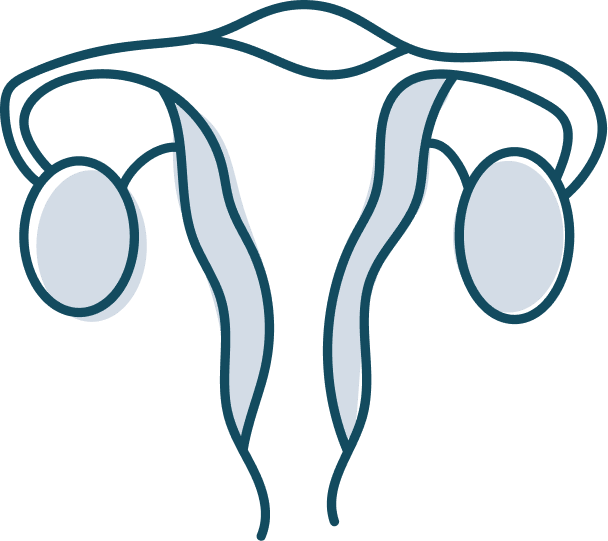Why is my period so heavy this month?
Words by
Dr Georgina Leslie, Clinical Lead at Bloomful
Updated on
21 Dec 2022
Is it normal for periods to change?
Yes. Periods and menstrual cycles can vary month-to-month, whether it’s the timing of your period or how heavy your flow is. You’ve probably noticed this yourself and have an idea of what’s within a normal range for you.
When should I see a doctor?
If you’re soaking a tampon/pad every 1-2 hours or you’ve noticed a significant change in your period and know this isn't normal for you (and this continues for a few months) then see your GP. If left untreated, heavy bleeding over months can lead to anaemia (low blood count). Because your body has less blood to carry oxygen to your organs, it has to work much harder to meet demands. This leads to fatigue, shortness of breath and palpitations. Heavy bleeding could also also be linked to a gynaecological condition, which is important to diagnose and treat.
If you experience a very heavy flow (where you quickly soak past a tampon/pad or pass clots of blood that are the size of a 50p coin or more) you should attend your GP or urgent care centre promptly. Attend A&E or call 111 if heavy bleeding is associated with a fever or feeling dizzy or faint.

What could be causing my heavy flow?
Hormone changes
Your menstrual cycle is governed by hormones. These hormones help the lining of the uterus grow and thicken ready to receive an embryo should you become pregnant.
The key hormones to be aware of in this equation are oestrogen and progesterone. Oestrogen thickens the lining of the uterus (the endometrium), while progesterone balances it out, keeping the endometrium thin. The endometrium is the tissue that comes out as menstrual blood during your period. If the oestrogen is not well balanced by the progesterone, you’re likely to have a thicker endometrium. A thicker endometrium means there’s more tissue to shed, hence the heavy flow. A thicker endometrium also contains more blood vessels, which contributes to a heavier period.
It follows that any hormonal changes you experience can affect the endometrium and therefore how much you bleed during your period.
Changing hormonal contraceptive
Switching from one hormonal contraceptive to another can disrupt your hormonal balance in a similar way. This is usually temporary and only lasts a few months. In general, hormonal contraceptives reduce the amount you bleed once you’ve been on them for a few months. All hormonal contraceptives contain types of progesterone (remember, this is the hormone that keeps the lining thin). It's also common to experience a heavier or earlier period if you take an emergency hormonal contraceptive (eg morning after pill).
Copper IUD
A common side effect of the copper coil contraceptive is heavier periods. Several theories try to explain this including inflammatory changes, physical irritation and vascular changes to the endometrium. If you find that there is a significant change, for example, if you experience flooding, clotting or pain, ask your healthcare provider about changing to a progestogen-containing coil or taking non-hormonal medication to alleviate the symptoms.
Perimenopause
In the years approaching menopause (when your periods stop) there can be fluctuations in your hormones. As a result, your periods can fluctuate as well.
Pregnancy loss or postpartum
After experiencing a pregnancy, your hormonal cycle has to reset, leading to possible changes in your period. The same applies to pregnancy loss.
Gaining weight
People who have been exercise-training, or have lost significant weight, may find that their periods reduce in flow, become sporadic or even stop altogether. In simple terms, your body recognises you’re under stress and tries to conserve energy. It also deems it to be an ‘unsafe’ time for pregnancy and so interrupts your normal hormonal cycle to prevent ovulation.
As you reduce this training or start to gain weight, your periods can return to a more regular cycle and can be heavier than before. Women who develop excessive adipose tissue (body fat) produce oestrogen from this tissue and, as we know, oestrogen thickens the endometrium resulting in heavier blood flow.
Stress
Being under physical and emotional strain can disrupt your body’s systems, including your hormonal cycles. Some people experience irregular or lighter periods when they are stressed, while others find that their periods come less often, but are heavier as a result.

Infection
A pelvic infection, particularly a sexually-transmitted infection can lead to a heavier than normal period. If you’ve had sex without a barrier method and think you might be at risk of an STI (especially if you have new pelvic pain or change in your discharge prior to your period) then you should get tested. Most sexual health clinics can post you a testing kit. However, if you have a fever, you should get yourself to a clinic, the GP or the Accident & Emergency department at your local hospital. This can be a sign of more severe pelvic inflammatory disease.
Blood thinners
Starting a new medication and even some herbal preparations that thin your blood, can increase the heaviness of your period. Anticoagulants and other anti-inflammatories allow blood to flow more easily through your body by preventing clots. This affects the endometrial lining in the same way. Clotting and closure of the endometrial vascular complex is prevented and so more blood flows out in the form of a heavy period.
Bleeding disorders
If you have a bleeding disorder such as haemophilia or Von Willebrand’s disease you may experience heavy periods. Bleeding disorders are often accompanied by symptoms such as anaemia, easy bruising, prolonged bleeding after injuries and nose bleeds that are difficult to control.

Which gynaecological conditions are linked to heavy periods?
Fibroids and polyps
Fibroids are benign growths in the muscle of the uterus. While they can cause heavier periods in general, sometimes they lead to an even heavier bleed. Fibroids increase the size of the uterus and also the surface area of the endometrium, resulting in more blood to be shed.
Polyps are small growths that can occur in the endometrial lining. They tend to contain lots of blood vessels and are fragile and more prone to bleeding. This may result in a heavy period but can also cause irregular bleeding when your period isn’t due.
Polycystic ovary syndrome (PCOS)
PCOS is a condition caused by a hormone imbalance. People with PCOS often have periods which occur at irregular times and are more spaced out than the normal 28-day cycle. When periods occur infrequently, they are usually heavier and can also last for longer as well. In simple terms, the endometrium has had longer to build up before shedding as menstrual blood.
Uterine cancer
While rare, uterine cancer can be the cause of a heavy period. Usually, you will have other symptoms, such as bleeding after the menopause, bleeding between periods and pink/dark/foul discharge. Only a small number of women with irregular bleeding will actually have uterine cancer. Most people who develop uterine cancer are older women (it’s much less common in those younger than 40).
Key takeaways
- There could be many causes for your heavy period.
- While a one-off heavy period shouldn’t worry you, it’s sensible to have a chat with your GP if there is no obvious cause.
- If your bleeding is heavy every month, then this should be investigated. Heavy bleeding can lead to anaemia and can be masking an underlying condition that needs to be treated.
Care from the comfort of your home
When was the last time you felt truly heard by a healthcare professional? At Bloomful, our clinicians listen deeply, ask the right questions, and commit to helping you overcome the health hurdles that are holding you back.
